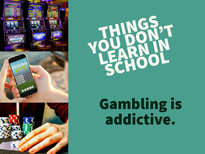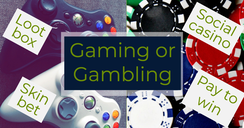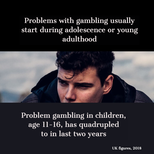Information on Our Gambling Awareness School Talks, Delivered by Tony O'Reilly (Co-Author of 'Tony10'), is Available Here
Parents' Guide to Gambling in Ireland

How children feel about gambling is strongly influenced by their home environment and society around them and in Ireland there is a strong culture of gambling. Latest figures, published by the Department of Health, show that two-thirds of the population have gambled in the last 12 months and more than 40% of people gamble on a monthly basis or more often. Ireland has the third highest gambling losses per capita in the world; Irish people lose a shocking €3.2 billion to gambling every year. Our own behaviours and attitudes to gambling, coupled with widespread advertising from betting companies, are normalising gambling for a generation of children.
The prevalence of problem gambling among children is rising fast. There are no research figures available for Ireland but the number of UK children, age 11-16 years old, with gambling problems has quadrupled in the last two years. Compared with other potentially harmful activities, UK figures show that rates of gambling are higher among young people than the rates of of drinking alcohol, smoking cigarettes or taking illegal drugs. This is a serious public health concern when you consider that 1. people who develop gambling disorders earlier in life also tend to have problems with substance abuse or impulsivity disorders and 2. gambling addiction can cause people to harm themselves; problem gamblers are 15 times more likely to take their own lives.
The prevalence of problem gambling among children is rising fast. There are no research figures available for Ireland but the number of UK children, age 11-16 years old, with gambling problems has quadrupled in the last two years. Compared with other potentially harmful activities, UK figures show that rates of gambling are higher among young people than the rates of of drinking alcohol, smoking cigarettes or taking illegal drugs. This is a serious public health concern when you consider that 1. people who develop gambling disorders earlier in life also tend to have problems with substance abuse or impulsivity disorders and 2. gambling addiction can cause people to harm themselves; problem gamblers are 15 times more likely to take their own lives.

Education about gambling
Early introduction to gambling can be critical in the development of a gambling addiction so it is important to consider all the ways in which your children are exposed to the idea of gambling during childhood and conditioned to gamble later in life. Educating them about the potential risks involved and the myths that surround gambling is vital if they are to develop a healthy relationship with gambling as adults. However, unlike other risky behaviours, like substance abuse, awareness of gambling related harms is not part of the current SPHE curriculum taught in Irish schools. It falls to parents to explain the world of gambling to their children. The full Parents' Guide to Gambling can be downloaded, which details how you can reduce exposure to gambling and provides advice on talking to children about gambling.
Early introduction to gambling can be critical in the development of a gambling addiction so it is important to consider all the ways in which your children are exposed to the idea of gambling during childhood and conditioned to gamble later in life. Educating them about the potential risks involved and the myths that surround gambling is vital if they are to develop a healthy relationship with gambling as adults. However, unlike other risky behaviours, like substance abuse, awareness of gambling related harms is not part of the current SPHE curriculum taught in Irish schools. It falls to parents to explain the world of gambling to their children. The full Parents' Guide to Gambling can be downloaded, which details how you can reduce exposure to gambling and provides advice on talking to children about gambling.

Gambling guide for gamers
There is a lot of talk in the media about the “gamblification of gaming” and the blurring of lines between gambling and gaming. Concerns have been raised about the danger to young gamers in particular, who could develop an unhealthy relationship with gambling as as result. As the demographic for gaming is young and very tech-savvy it can be a daunting task for parents to keep up with all the new terminology and technology in this area. Our Gambling Guide for Gamers explains how your child could be exposed to gambling concepts through games and advice on how to talk to young gamers about gambling risks and myths.
You can also check out our blog posts written for CyberSafeIreland, which provide advice to parents about specific risks in games.
There is a lot of talk in the media about the “gamblification of gaming” and the blurring of lines between gambling and gaming. Concerns have been raised about the danger to young gamers in particular, who could develop an unhealthy relationship with gambling as as result. As the demographic for gaming is young and very tech-savvy it can be a daunting task for parents to keep up with all the new terminology and technology in this area. Our Gambling Guide for Gamers explains how your child could be exposed to gambling concepts through games and advice on how to talk to young gamers about gambling risks and myths.
You can also check out our blog posts written for CyberSafeIreland, which provide advice to parents about specific risks in games.

Recognising the signs of teenage gambling
With substance abuse it is often easier for parents to spot the signs that their teenager is at risk but gambling is known as a “silent addiction” as it is easier to hide. This is even more true today with betting apps and online games making it easier than ever to gamble in private. There are some indicators that you can use to recognise when your teenager has developed a problem with gambling and advice on how you can talk to them about their gambling in our guide, Recognising the signs of teen gambling.
With substance abuse it is often easier for parents to spot the signs that their teenager is at risk but gambling is known as a “silent addiction” as it is easier to hide. This is even more true today with betting apps and online games making it easier than ever to gamble in private. There are some indicators that you can use to recognise when your teenager has developed a problem with gambling and advice on how you can talk to them about their gambling in our guide, Recognising the signs of teen gambling.